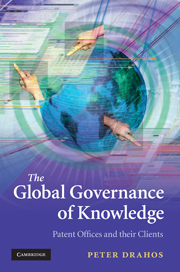Book contents
- Frontmatter
- Contents
- List of diagrams and tables
- List of abbreviations
- Preface
- 1 Patent offices and the global governance of knowledge
- 2 Labyrinths and catacombs: Patent office procedure
- 3 The rise of patent offices
- 4 The Sun and its planets: The European Patent Office and national offices
- 5 The USPTO and JPO
- 6 The age of Trilaterals and the spirit of cooperation
- 7 The jewel in the crown: India's Patent Office
- 8 The dragon and the tiger: China and South Korea
- 9 Joining the patent office conga line: Brazil
- 10 Islands and regions in the patent stream
- 11 Reclaiming the patent social contract
- 12 Patent administration sovereignty: Nodal solutions for small countries, developing countries
- Index
- References
2 - Labyrinths and catacombs: Patent office procedure
Published online by Cambridge University Press: 03 May 2010
- Frontmatter
- Contents
- List of diagrams and tables
- List of abbreviations
- Preface
- 1 Patent offices and the global governance of knowledge
- 2 Labyrinths and catacombs: Patent office procedure
- 3 The rise of patent offices
- 4 The Sun and its planets: The European Patent Office and national offices
- 5 The USPTO and JPO
- 6 The age of Trilaterals and the spirit of cooperation
- 7 The jewel in the crown: India's Patent Office
- 8 The dragon and the tiger: China and South Korea
- 9 Joining the patent office conga line: Brazil
- 10 Islands and regions in the patent stream
- 11 Reclaiming the patent social contract
- 12 Patent administration sovereignty: Nodal solutions for small countries, developing countries
- Index
- References
Summary
Welcome to the maze
As we saw in our discussion of patent law harmonization, while convergence in patent law is taking place at the level of principles, there is a long way to go at the level of rules. When it comes to the procedural rules relevant to the patent application process there is an enormous diversity of very detailed rules. For example, in the US the Consolidated Patent Rules amount to about 350 pages and a few thousand rules. This does not count the notices, guidelines and amendments that the USPTO issues in any one year relevant to its rules. The USPTO is not alone in administering a system of great rule complexity. In Australia, the Patent Regulations take up more than 490 pages.
The comparative advantage of patent attorneys lies not in their knowledge of patent law, but in their knowledge of many hundreds of rules and guidelines that make up patent procedure and the drafting of the claims that define an invention. A key part of their work is keeping track of the many deadlines that exist for the submission of documentation that accompanies the application process, deadlines which if not kept to will result in extra fees or in some cases the loss of the applicant's rights. The tedium of precise time and document management over what may be many years in relation to a single application, which may end up being withdrawn or rejected, is the price patent attorneys pay for their lucrative practices.
- Type
- Chapter
- Information
- The Global Governance of KnowledgePatent Offices and their Clients, pp. 55 - 90Publisher: Cambridge University PressPrint publication year: 2010



